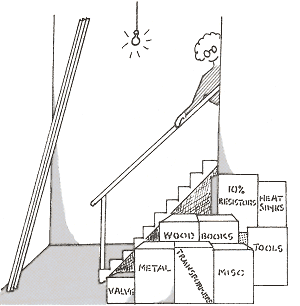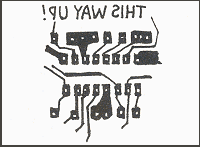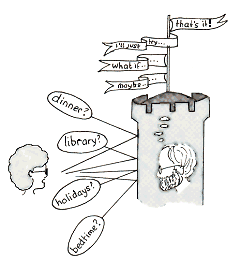Part 2 - The Engineer's Wife and new technology
There was a brief time when both John and I were writing for the Maplin Electronics magazine. We quickly realised that the magazine paid for content by the page, so we made sure we included lots of big diagrams and cartoons.
Part 1 of this Lament can be found here ...
A version of this article appeared in the Maplin Magazine of October 1989.
Those of you read my previous lament on the plight of being the non-engineering wife of an engineer will be relieved (or amazed) to know that I am still married to that engineer and my father-in-law still talks to me. I suspect that it might be because those two engineers are planning to write about the trials of having a non-engineer wife/daughter-in-law. If this is the case, I will leave the country. In the meantime, here is the remainder of my lament Whilst you read it I will be looking for my passport.
I know I am not an engineer, but now we have the new technology why do we still keep the old technology? Is it just in case it comes back into fashion again, liked flared jeans? Not even that, I realise. It's because it might just come in handy one day. 'It' can be anything from a book on illnesses in parrots to ten lengths of copper pipe and a box of assorted valve holders, and anything you can think of in between, if our house is anything to go by. My non-engineer's life is filled with baffling questions about why engineers behave the way they do. How do they get away with it? And why do they never throw anything away?
 We moved house recently because we needed more space. I could easily justify moving the tea-chests of seasoned timber, old picture frames and empty Kilner jars which have accompanied us to each of our last three houses. Anyone would agree that it would be foolish to throw these away. But why do we also keep tea-chests of transformers, small bits of metal, large bits of metal, unidentified half-finished circuit boards, finished but finished-with circuit boards, wartime radio sets, small loudspeakers, large loudspeakers, even cinema loudspeakers (and they are extremely large), switches, relays, boxes of valves (valves?) and old television sets? I detect my father-in-law's influence, and his ''have this, because it might be useful", whenever I go down into the cellar.
We moved house recently because we needed more space. I could easily justify moving the tea-chests of seasoned timber, old picture frames and empty Kilner jars which have accompanied us to each of our last three houses. Anyone would agree that it would be foolish to throw these away. But why do we also keep tea-chests of transformers, small bits of metal, large bits of metal, unidentified half-finished circuit boards, finished but finished-with circuit boards, wartime radio sets, small loudspeakers, large loudspeakers, even cinema loudspeakers (and they are extremely large), switches, relays, boxes of valves (valves?) and old television sets? I detect my father-in-law's influence, and his ''have this, because it might be useful", whenever I go down into the cellar.
If these things are supposed to be so useful, why haven't they all been used by now? I can honestly say that I have never thrown anything away without holding a full conference with all interested parties. Almost inevitably the feeling of the meeting is on the side of caution, so we keep it, just in case. It is even more exasperating when the engineer needs some particular thing and says ''I remember I had one of these in 1973. I know I wouldn't have thrown it away - have you seen it?" Why should I have seen it? Storage retrieval systems take on a whole new meaning in our house.
I do wonder how the engineer contrived to be abroad on business for the weeks leading up to each of our two most recent house moves. Might it have been because of those lurking teachests? I know that logistics is one of my departments, but going to Los Angeles and Hong Kong so that I could get on with the planning seems a bit drastic.
And when I was designing a new kitchen for this house I thought that last I had a real chance to exploit new materials and new technology. But then I remembered that the sink would have to cope with occasional splashes of ferric chloride from the PCBs we make, as well as potato peelings, so white was out and stainless steel was in.
 In our business we do a lot of prototyping, hence those printed circuit boards. Since I got 'O' level Art in 1961 and the engineer didn't even take Art because he was too busy taking terrifying subjects like Physics and Chemistry, PCBs are another of my departments. Why does it take much longer to plan a single-sided track layout than it ever did to build a nice noisy rats nest of wiring? Why did I track the logic circuits upside down in my first complicated PCB artwork and not find out until we had made the board and started to put the IC's in? Does that explain why the engineer wanted PSpice for Christmas, rather than Old Spice?
In our business we do a lot of prototyping, hence those printed circuit boards. Since I got 'O' level Art in 1961 and the engineer didn't even take Art because he was too busy taking terrifying subjects like Physics and Chemistry, PCBs are another of my departments. Why does it take much longer to plan a single-sided track layout than it ever did to build a nice noisy rats nest of wiring? Why did I track the logic circuits upside down in my first complicated PCB artwork and not find out until we had made the board and started to put the IC's in? Does that explain why the engineer wanted PSpice for Christmas, rather than Old Spice?
New technology even comes through our letterbox. Why do we get so many technical magazines through the post? Especially, why do we get two copies of the ones we don't want? And when we fill in the (really quite useful) Reader Enquiry cards, why are we sent catalogues for office furniture as well?  My office is perfectly adequate. It contains a desk, filing cabinet, computer table, shelves on two walls, a swivel chair (from which I can reach all these things) and me. There isn't enough room for another chair, never mind an executive coat stand or an ergonomically curved workstation in stylish high-impact plastic. We get enough high impact from the hammers of all those plumbers, joiners and builders installing their new technology in our old house, without needing any more.
My office is perfectly adequate. It contains a desk, filing cabinet, computer table, shelves on two walls, a swivel chair (from which I can reach all these things) and me. There isn't enough room for another chair, never mind an executive coat stand or an ergonomically curved workstation in stylish high-impact plastic. We get enough high impact from the hammers of all those plumbers, joiners and builders installing their new technology in our old house, without needing any more.
The recent technical magazines are stored (temporarily, I hope) on the hall windowsill waiting for another filing cabinet in which to keep the useful parts. We never know what we will be asked to do next, so every few months we tear out and keep any article which has a remote connection with our work, and quite a few which do not. I know I've said it before, but why do engineers never throw anything away?
And of course we have to keep ourselves up-to-date with new technology. When we go to trade exhibitions, why do the staff on the stands always assume
 that I am just along to carry the bags? I know I am, but why should they? Properly briefed, I can hold a coherent conversation on a dinner party level (informed but not in depth) about most things. Why do I always get asked about working voltages or clock frequencies? I know the difference between plain flour and self-raising flour, but why should I also be expected to know the difference between SRAM and DRAM? I suppose self-raising flour is dynamic in its way, but some knowledge comes hard when you're not born to it.
that I am just along to carry the bags? I know I am, but why should they? Properly briefed, I can hold a coherent conversation on a dinner party level (informed but not in depth) about most things. Why do I always get asked about working voltages or clock frequencies? I know the difference between plain flour and self-raising flour, but why should I also be expected to know the difference between SRAM and DRAM? I suppose self-raising flour is dynamic in its way, but some knowledge comes hard when you're not born to it.
And, by the way, why don't the marketing men at exhibitions ever give away anything useful? We're up to our knees in keyrings, personalised luggage labels, notepads, footballs and throwaway pens (which we should throw away, come to think of it). What about offering paint brushes or gardening gloves?
Now that we have a few PC's scattered around the house, why must we feel that we have to use computers for everything? We analysed the housekeeping as a way of introducing me to spreadsheets; that was a very salutary lesson. We also found out that we had missed the best time, from a tax point of view, to change my car. I'd rather not have known that. We calculated heat losses for the new central heating system, prepared speeches for the children's school debating society (then we had to do it for their friends, too). I produced the accounts for the school PTA for years, because we had this Apple.
Which reminds me - some time ago we returned from a year of living (and working) in California. We had bought the Apple over there because the dollar rate was so good. But why did we bring the computer home in a suitcase, and leave the new bedding and towels and clothes and kids' toys to be shipped by sea and arrive six months later?
Whilst on the subject of business trips abroad, why did the engineer go to the Far East on a cost reduction exercise for a client, when it was the engineer's wife who had wrestled with the circuit diagrams and identified, listed, counted and costed the hundreds of components involved? I did get a pretty kimono out of it, but it would have been nice to choose it myself. Still, I was supposed to be busy keeping everything else ticking over while the engineer was away.
I am constantly amazed by the different approach to life which I have seen in engineers. I'm quite used to doing five different things at once, and I seem to have a built-in clock which suddenly tells me to save the work on the computer because it's time to collect the kids. This ability is wrongly seen as scatterbrained by engineers of my acquaintance, but it's honestly the only way I know to make sure that everything gets done more or less on time.
Engineers however can completely ignore clocks (and calendars: my birthday this year will be on the same day it was last year, but it will still come as a terrible surprise). Food and sleep and evenings with friends can threaten deadlines or concentration, usually both. We are used to being told that people have an attention span of three minutes, or half-an-hour, or whatever, depending on what they are doing.
Engineers are the only people I know who have an attention span close to infinity, though software-writers come a close second. My deadlines are hardly ever more than a few hours away: shops, meals, dishwasher, washing machine, vacuum cleaner, children, even the engineer, all need regular attention. Because of this, I can only immerse myself in a project if I have set my watch alarm to remind me of the next deadline. And I can't ignore it. I just have to stop what I am doing and go on to the next job. But all of these insignificant and boring activities make it possible for engineers to remain in their ivory towers. (The engineer points out that scientists live in ivory towers - engineers build them.)
 So I am constantly bemused by engineers' obsession with work. It seems to be impossible to get their full attention without making them lose the sequence of ideas chugging through their heads, so that they have to start all over again. Do the eyes of husbands in other professions regularly glaze over in the middle of dinner, halting all other activity? We think we are having a normal family dinner-time conversation, but the problems that were bugging the engineer in his lab are still in his head in the dining room, and clever answers occasionally pop up demanding to be written down, now. So conversation stops until a clipboard is found, usually under a pile of trade magazines. Then we try to remember what the rest of us were talking about.
So I am constantly bemused by engineers' obsession with work. It seems to be impossible to get their full attention without making them lose the sequence of ideas chugging through their heads, so that they have to start all over again. Do the eyes of husbands in other professions regularly glaze over in the middle of dinner, halting all other activity? We think we are having a normal family dinner-time conversation, but the problems that were bugging the engineer in his lab are still in his head in the dining room, and clever answers occasionally pop up demanding to be written down, now. So conversation stops until a clipboard is found, usually under a pile of trade magazines. Then we try to remember what the rest of us were talking about.
Can anyone tell me why engineers always have to solve design problems with such complicated solutions? Being a simple soul, I would try the easy ones first, but then I am not an engineer. Every modification seems to need five more resistors and three more capacitors, sometimes even another IC and six more resistors and three diodes which have to go on a daughter board because the main board is full. And why do these mods always happen after the PCB has been made?
All engineers know that problems are easier to identify and solve if they can talk them through. In our business, I am usually the other half of such conversations. But why does the solution always become obvious to the engineer when he is half way though explaining the problem to me? I can usually only understand one word in three, and my grasp of the concepts involved is no more than hazy. Why do my simple-minded questions sometimes make him pause, then ignore me completely because he has thought of a possible way through to where he wants to be? I get quite fed up at hardly ever hearing the end of the original problem, even though I didn't understand it in the first place.
So here I still am, struggling with a technology which I might finally understand when the rest of the world is using sub-nanosecond optical computers. What started me off on all of this was thinking while doing the ironing. There's another pile waiting, so I'd better go and get on with it. I'll listen to the radio this time.
